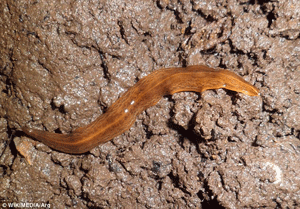Growers, retailers and gardeners are being urged to stay vigilant to stop an invasive flatworm from Brazil from gaining a foothold in the UK and posing a threat to soil health and wildlife.
The worm, which has a 4.5cm long flattened leaf-shaped body, was discovered at an Oxfordshire garden centre during the summer in an imported potted heuchera from Holland. Its first sighting in Europe was on Guernsey in 2008, since when it has spread to France, Italy and Spain. 
In some soils where they have colonised, earthworm populations have reduced by 20%. They also eat land snails. Earthworms are vital soil conditioners, fertilising and aerating the earth, helping to maintain its structure and aiding the absorption of moisture.
UK Buglife wants the government to employ stricter screening of imports to stem what its CEO Matt Shardlow describes as “an avalanche of harmful and unwanted species” with the potential to damage farming, destroy wildlife and distress gardeners. “Our biosecurity is feeble. It is time for the government to take control of this problem before it gets completely out of hand,” he said.
Plants are moved around the globe today in increasing volumes and at greater speed, which increases the risk of invasive pests surviving on imported exotics.
A Defra spokesman told The Guardian this week that it took biosecurity extremely seriously: “We work closely with neighbouring countries, the wider international community, industry, charities, landowners and the public to reduce the risks.”
The HTA had not responded to GTN Xtra’s invitation to comment before this issue was mailed.